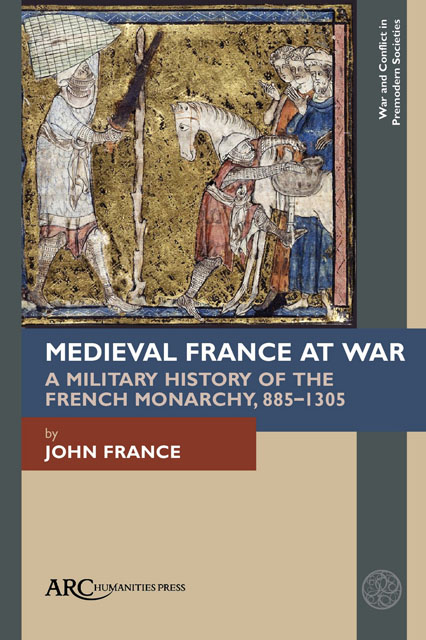Book contents
- Frontmatter
- Contents
- List of Illustrations
- Preface
- Introduction
- Chapter 1 Technology and Warfare
- Chapter 2 The Emergence Of France
- Chapter 3 French Monarchical Power in Context
- Chapter 4 Warfare In France To 1066
- Chapter 5 A Clash Of Dynasties 1066– 1180
- Chapter 6 Philip Ii and The Rise of France
- Chapter 7 The Expansion of France
- Chapter 8 Louis Ix and The Apogee Of French Power
- Chapter 9 The Problems Of Power
- Chapter 10 Perspectives on The Army of The Kings of France
- Bibliography
- Appendix: A Note on Sources
- Index
Appendix: A Note on Sources
Published online by Cambridge University Press: 06 April 2023
- Frontmatter
- Contents
- List of Illustrations
- Preface
- Introduction
- Chapter 1 Technology and Warfare
- Chapter 2 The Emergence Of France
- Chapter 3 French Monarchical Power in Context
- Chapter 4 Warfare In France To 1066
- Chapter 5 A Clash Of Dynasties 1066– 1180
- Chapter 6 Philip Ii and The Rise of France
- Chapter 7 The Expansion of France
- Chapter 8 Louis Ix and The Apogee Of French Power
- Chapter 9 The Problems Of Power
- Chapter 10 Perspectives on The Army of The Kings of France
- Bibliography
- Appendix: A Note on Sources
- Index
Summary
ONE OF THE legacies of the classical world was the desire to record events, and this was particularly transmitted to the medieval west through the work of Eusebius. This urge was often expressed by entering brief records in Easter tables, which were used by churches to calculate the date of Easter. These grew into year by year records or annals, often memorializing events of local importance to a particular church or monastery. The seventh century Chronicle of Fredegar was a notable effort at a universal history based on ancient sources, but it is of chief value for its history of the Franks. The Royal Frankish Annals cover the period from 741 to 829, and, while they are certainly the work of many hands, they were composed at the courts of Charlemagne and his successor, Louis the Pious, and have a notably official character centred on the doings of these emperors. After a gap these were resumed at Rheims in the Annals of St Bertin, which cover the period from 830 to 882.
This tradition was revived by Flodoard, a priest of Rheims, and carried through to 966, when he died. He had a real interest in the politics and warfare of his age and provides quite lively descriptions, though he is often very brief. Flodoard’s account was continued by Richer, another priest of Rheims, whose work spans the period from 888 to 995. Richer made extensive use of Flodoard, but from 966 his work is wholly original. He was a rather more discursive writer than Flodoard, and particularly important to this book because his father had been a soldier of Louis IV (936– 954). Richer was fond of parading his classical knowledge, however, and he can be very misleading. Between them, these two works provide a kind of backbone for the earlier part of this book. Among the other sources, Abbon’s account of the siege of Paris is extremely important, while that of Regino of Prüm is essential for our knowledge of Lorraine and the borderlands between what became France and Germany down to 915. Some royal and other records have survived, such as those collected by Lauer, but they are few and provide limited information on military matters.
- Type
- Chapter
- Information
- Medieval France at WarA Military History of the French Monarchy, 885-1305, pp. 237 - 240Publisher: Amsterdam University PressPrint publication year: 2022



